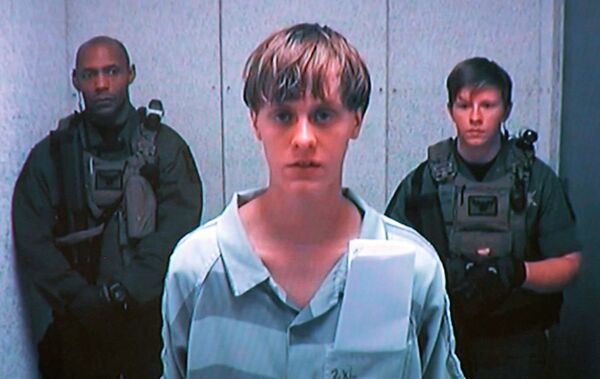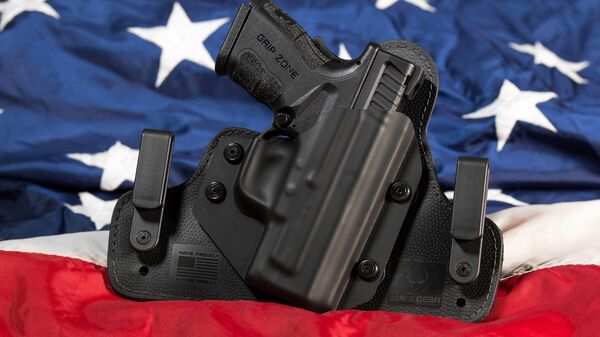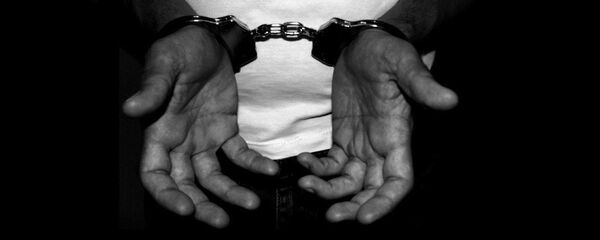Established in 1993 as a result of the Brady Handgun Violence Prevention Act, the FBI's National Instant Criminal Background Check System (NICS) identifies individuals legally precluded from buying guns before they buy them — sellers run a prospective purchaser's name into NICS, the FBI conducts a background check, and reports back to sellers on whether or not the customer is legally entitled to.
While loopholes in laws and regulations typically arise from sloppy or ambiguous wording, the 1993 Act specifically mandates that if a firearms seller doesn't receive a response from the FBI within three days, they can proceed with the sale — and the bureau does not contest this.
And they only have 72 hours to compete all of them. Congress forces background checks to be a wholly paper driven process. Any checks incomplete after 72 hours result in automatic OKs for gun buyers.
— Grant Stern (@grantstern) November 26, 2017
This makes Black Friday the best day of the year to try and illegally buy guns. https://t.co/EKGQKhCS50
Sales resulting from a failure to respond in the allotted time — "default proceeds" — are relatively rare. FBI data indicates in 2015, over 90 percent of background checks were immediately responded to, and a mere three percent of background check requests went unanswered.
Nonetheless, that seemingly meager three percent equates to around 370,000 purchases of guns without vetting that year alone — of which 2,892 buyers were in fact legally prohibited from owning firearms.
When a "default proceed" transacts, the FBI orders the Bureau of Alcohol, Tobacco, and Firearms (ATF) to retrieve the offending gun — in 2016, the FBI issued over 4,000 orders, the most the agency had requested in ten years.
Bigger revelation: "An entry regarding the incident was submitted to the FBI’s… database for gun purchases." https://t.co/fvcmol5UpL
— Griswold Christmas Vacation (@HashtagGriswold) November 7, 2017
One individual who infamously slipped through the FBI's web was Dylann Roof, in 2015. The 21-year-old white supremacist's former conviction for possessing a controlled substance should've prohibited his purchase — however, the FBI did not respond in time, and the sale went ahead. Not long after, he'd use his ill-gotten firearm to murder nine people in a Charleston, South Carolina church.

'Charleston Loophole'
Roof's inadvertent exploitation of the legal anomaly has led to it being dubbed the "Charleston Loophole" by lawmakers and the media — and in 2017, Democratic legislators in both Congress and the Senate introduced legislation that would close it.
This legislative failure persists despite polls consistently suggesting support for stricter gun control laws far outweighing support for current laws, or indeed their relaxation. Moreover, public backing for tighter gun control laws has fallen over time, from 78 percent in 1992 to 55 percent in 2016.
In 2017, the number of guns in circulation in the US stands at between 300 million and 420 million — and despite frequent mass-shootings, US gun ownership rules have not been substantially reformed since the 1993 Act.
Gun lobbying groups are typically blamed for this lack of progress — in particular the National Rifle Association (NRA), an advocacy group boasting vast resources and a membership base of around five million.
They’re all sending their thoughts and prayers. That’s a list of NRA lobbying funds. pic.twitter.com/27XLp2Ybjs
— theo (@RunSpotsRun) November 6, 2017
From January 1 to June 30 2017, the NRA spent US$3.2 million on lobbying — more the entirety of its efforts in 2016. Filings show the NRA lobbied 81 pieces of legislation in this period alone.
President Donald Trump's administration has also established itself as more pro-gun than its predecessor. On his first day in office, Secretary of the Interior Ryan Zinke revoked an Obama-era ban on the use of lead ammunition in wildlife refuges — and the Department of Justice has also shut down a financial crimes probe — Operation Choke Point — the NRA claimed unfairly targeted gun dealers. The ATF has also invited silencer companies to assist the Agency in streamlining the process for National Firearms Act permit applications.



